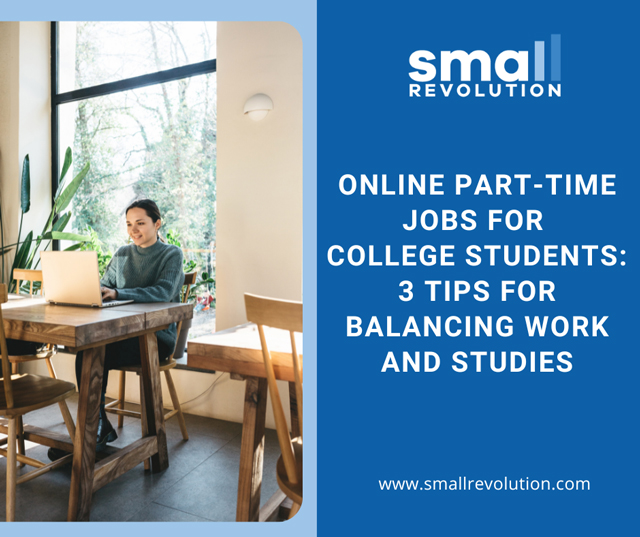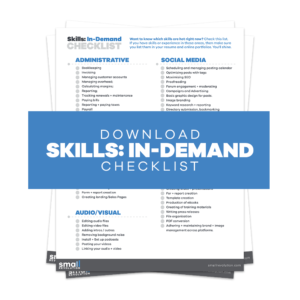Imagine never having to ask yourself, do I go to work or do I go to class?
You would never have to worry about missing class, and ultimately lowering your participation points, to write out an analytics report your boss wanted by the end of the day.
Gone are the days when you would need to sacrifice sleep to write a 3000 word essay for your Philosophy class and still be up early in the morning for your team’s Zoom meeting.
How?
What’s the secret to balancing working online while you’re still in college?
Simply put, it boils down to having a structured schedule, setting prioritized goals, and taking time to relax to balance it all out.
There are several benefits of remote work for college students including:
- Earning money to cover their living expenses, purchase school supplies, and enjoy entertainment
- Establish connections with aged professionals that they can maximize in the future to get well-paying jobs
- Working from the convenience of their dorm rooms or the school library makes it easier to transition from academic work to job-related tasks
While it is all easier said than done, many students successfully juggle working and studying and by enforcing these three tips, you can be one of them.
Tip 1: Create a Schedule and Stick To It

Working remotely in college sounds like a dream, but it can be overwhelming when you’re knee-deep in the action. Therefore, for your sanity’s sake, you must streamline your work and class schedules.
So, how can you optimize your schedule to guarantee that you allocate your complete focus to your work and academic commitments equally?
Fine-Tune Your Class Schedule To Meet Your Needs
When it comes to choosing classes for a semester, a good strategy is to pair a challenging and time-consuming course with easier electives.
At one point or another, you will encounter classes or professors that require more time and effort from you than others, so it’s helpful to balance your course load with less demanding classes.
This way, you can allocate enough time to complete tasks such as writing a complex report for your boss or handing in a revision that your professor demanded you rewrite a third time without risking burn-out.
Alternatively, you can schedule all your classes on 2 to 3 days of the week. By assigning specific days for attending lectures, completing assignments, and participating in extracurricular activities, you can give these tasks your undivided attention.
In some universities, students have to adhere to a class schedule provided by the instituition. In this situation, it’s best to speak to your employer and come up with a workaround that’s convenient for both parties.
Request a Customized Work Schedule From Your Boss
Now that you have leveraged your class schedule to free up half of your week, optimize your newly found free time to get some work done.
Here’s a brief guide on how to create a work schedule that is suitable for both you and your employer.
- Arrange a Zoom call or draft an email to your boss explaining your situation politely.
- Specifically, you can request that they assign you a particular number of hours per week to tackle your designated workload.
- Once you have agreed on terms that are convenient for both parties, develop a daily routine that you can follow to ensure that you meet your goals.
By adhering to a consistent schedule, you can develop time management skills that will free up time for you to squeeze in a few breaks and indulge in self-care.
Here’s an a sample schedule for a psychology major student who’s also a copywriter.
| Time | Monday | Tuesday | Wednesday | Thursday | Friday |
| 08:00 | BIO 115 Human Biology (4) | Anthropology (ANT) Elective (3) | Yoga | Edit and finalize email campaign | Conduct research for Facebook ads copy |
| 11:00 | PSY 200 Life Span Development | Psy Ed | Zoom meeting with Marketing Director | Brunch date with Fiona | Write Facebook ads copy |
| 14:00 | Communications | MAT 165 Introduction to Data Science | Write first draft for email campaign | Work on edits requested by Jon (Editor) | Get approval from Jon and run the campaign |
Notice how the student scheduled all her classes on the first two days of the week and used the rest for her copywriting responsibilities.
Tip 2: Set Clear Priorities and Goals

People have different approaches to life, with some living spontaneous and unplanned lives while others are more inclined to set goals to achieve certain objectives.
Our goal-setting mindset determines whether we move closer or farther away from our life’s aspirations.
For example, the fact that you are in college and working probably means that you ultimately want to distinguish yourself from other students by utilizing your work experience to find a well-paying job.
As an employed student, your goals can be conflicting and distracting in many ways. Therefore, it’s crucial that you come up with a strategy to prioritize and arrange your objectives.
Begin by reflecting on your aspirations and accounting for three key aspects of your life; online work, school, and personal needs. Then, categorize each aspect according to the time it will take to attain each goal; long-term, mid-term, and short-term.
For instance, your long-term goals might be along the lines of graduation or using the expertise you have gained from working and studying to start a new business.
On the other hand, your short-term and mid-term goals are usually more immediate.
They could involve setting goals to write your essays on the first Monday of every month, reading a chapter of a self-help book every week, or socializing and networking with your coworkers for 10 minutes daily.
However, many people fail to understand that prioritizing goals is not a matter of deciding which task is more important than the others. Instead, you need to ask yourself one question: which task is the most important right now?
In the long run, your short-term and mid-term goals serve as building blocks for achieving your long-term goals. Consequently, it is advisable to establish your long-term goals first and then reverse engineer your short-term and mid-term goals afterward.
Expert Tip: Write out your goals by hand and go into as much detail as you can. The more vivid your description, the higher your chances for success.

Tip 3: Take Care of Yourself
As you’re getting into a rhythm and finding a balance between your academics and your professional life, taking a break from your long to-do list will feel counterintuitive.
However, studies indicate that dedicating time to self-care, which nourishes your mental, physical, and emotional well-being, can ultimately reduce stress and keep you connected to what matters most.
It’s worth noting that self-care methods vary from person to person, and what works for you may not work for others.
The only thing that matters is that you occasionally take time away from your computer and textbooks to indulge in something that makes you happy.

Here are some ideas on how you can make self-care a priority.
- Join a club. This is a brilliant way for you to relieve stress while building connections with like-minded peers. Most colleges have numerous types of clubs that you can join and meet with on campus for free.
The trick is to find one that aligns with your interests so you can enjoy doing it. For instance, if you’re an engineering student that’s always been interested in theater, you could consider joining a theater and arts club. - Spend time with friends and family. Research suggests that remote workers are prone to bouts of depression caused by isolation.
Just because you’re an employed student doesn’t mean you don’t deserve to enjoy your college experience and socialize with your loved ones. Make it a point to see your friends and family at least once per week in person. - Practicing mindfulness. Mindfulness is a type of meditation that promotes acceptance and living in the moment.
When things get a bit much, and you feel like you don’t have it in you to sit through another difficult business meeting or lecture, open the Headspace app for guided meditation sessions that last between 10 and 15 minutes.
As an employed student, it is essential to prioritize goals that align with your long-term objectives, such as graduating with excellent grades, attaining financial stability, and gaining professional experience.
If you develop a systematic schedule that incorporates both your academic and professional life, you can carve out time to focus on your physical and mental well-being as well.
This way, you can ensure that you maintain a balance between your different responsibilities and achieve your desired outcomes.
If you want to jumpstart your online career, transition to a new one, or enhance your current skills, then visit Small Revolution today. It is the best online learning platform with comprehensive resources to help you launch your journey toward success now.
Share on Facebook:



